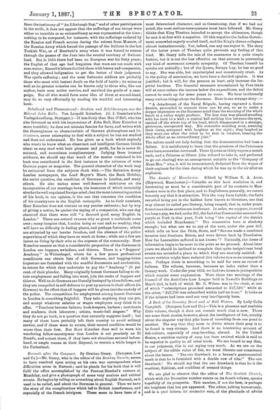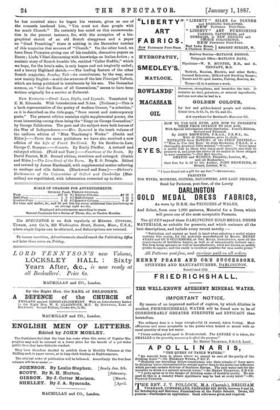A Book of the Running Brook and of Still Waters.
By Lady Colin Campbell. (Sampson Low and Co.)—This is a pleasant and readable little volume, though it does not contain much that is new. There are some fresh stories, however, about the intelligence of fish, notably about the singular way that pike have of travelling from one pond to another. The way that they seem to divine where their prey is to be found is very strange. And there is an interesting account of fish-culture, especially of carp-breeding, abroad. In the United States, a scaleless variety of carp has been evolved which is said to be superior in quality to all other kinds. We are bound to say that, in our judgment, this is not saying very much. As we are on the subject of the edible value of fish, we must liberate our conscience about the bream. " The one drawback to a bream's gastronomical merit is that be is furnished with a double row of ribs." The one drawback ! We should say that the one drawback is that he is the woolliest, flabbiest, and muddiest of created things.
We are glad to observe that the editor of The Scottish Church, which with the December number enters on its fourth volume, speaks hopefully of its prospects. This number, if not the beat, is perhaps the brightest that has yet appeared. The editor, talking humorously, and in a quot lectores tot sententio3 vein, of the plenitude of advice
he has received since he began his venture, gives as one of the counsels tendered him, " You must not dose people with too much Church." He certainly has acted on this recommenda- tion in the present instance, for, with the exception of a bio- graphical sketch of an old Scotch clergyman and a paper on "Good Preaching," there is nothing in the December number of this magazine that savours of "Church." On the other hand, we have Dean P!umptre giving one of his readable, discursive papers on Dante ; Linda Yillari discoursing with knowledge on Italian fiction ; a realistic story of Scotch bumble life, entitled "Caller Haddie," which we hope, for the hero's sake, is only began and not tragically ended ; and a breezy Highland sketch.—The leading feature of the other Scotch magazine, Sunday Talk—its contributors, by the way, seem now mainly English—is still the sermons of the late Principal Tnlloch, which are being published in instalments by his son. The December sermon, on " God the Home of all Generations," seems to have been written originally for a service at Balmoral.















































 Previous page
Previous page